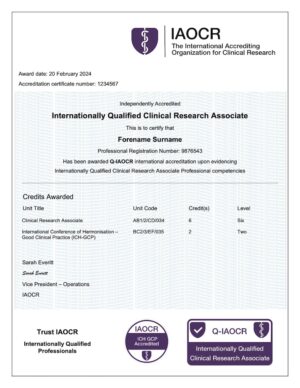Accreditation programs, such as those offered by the International Accrediting Organization for Clinical Research (IAOCR) greatly benefit clinical researchers by validating their knowledge and skills.
Here are four professional challenges where that validation offers the greatest benefits.
Navigating the pressures of a clinical researcher role
Clinical research positions are beset by numerous pressures that undermine a clinical researcher’s confidence in their capabilities.
There is the pressure to produce high-quality, error-free data. Concerns about data management can undermine a researcher’s confidence, as they may doubt their ability to ensure the reliability of their data.
The high stakes involved in ethical considerations can cause researchers to question their judgment and decision-making abilities. The responsibility of safeguarding participants and adhering to ethical guidelines can be intimidating.
Researchers may worry about not fully understanding the regulatory environment. The clinical research field is heavily regulated to ensure the safety and efficacy of medical treatments and interventions. Researchers must comply with numerous complex regulations and guidelines where even minor non-compliance can lead to significant consequences, including the invalidation of study results, legal ramifications, and harm to patients.
Keeping up with rapid technological changes can also be overwhelming. Researchers may feel outpaced by peers or industry standards and inadequate if they are not proficient with the latest tools and methodologies.
In all of these examples, achieving professional certification (accreditation) boosts a clinical researcher’s confidence in their abilities.
Managing diverse teams
Clinical research teams are typically multidisciplinary, comprising researchers, clinicians, data managers, statisticians, regulatory affairs specialists, and others – often spread across multiple countries. Each group has its language, methodologies, and priorities, which can create communication barriers and misunderstandings.
Researchers may struggle with interdisciplinary communication and collaboration, especially if they are not familiar with the terminology and methodologies of other disciplines. This can lead to misunderstandings, conflicts, and a feeling of isolation, diminishing confidence in their ability to contribute effectively to the team.
Team leading requires strong interpersonal skills and the ability to mediate conflicts and align diverse team members toward common goals.
Certification demonstrates a recognized level of expertise and commitment to the field, enhancing the clinical research professional’s credibility with colleagues.
Seeking a promotion to a position with new responsibilities
Accreditation can pave the way for clinical research professionals to gain a higher-level position.
Promotions typically follow a track of increasing responsibility, where researchers first excel in their specialized roles, showcasing their ability to manage projects and stakeholders, handle complex data, and ensure regulatory compliance. Their performance in these areas, combined with strong communication, organization, and collaboration skills, can catch the attention of senior management.
Clinical researchers can get promoted to higher positions even if they lack direct experience and competence in some key responsibilities. Candidates need to convince an employer that they can grow into a role with new responsibilities so obtaining professional accreditation can play a crucial role in preparing researchers for advancement.
Employers and clinical research professionals may discover competence gaps or performance difficulties after the professional has been promoted. Participating in an accreditation assessment prior to promotion can help to ensure the professional has the competencies needed to perform well and/or identify what targeted training can be provided to support the bridging of any gaps so that they can grow into their new role successfully.
Candidates can impress employers by demonstrating their commitment to professional development, demonstrating their expertise, leadership skills and growth potential.
Networking amongst peer groups
Having an accreditation in common with a new contact makes it easier to reach out to them and ask a question, suggest a collaboration or simply add them to your network.
Many certification programs offer access to exclusive professional networks or forums. These platforms facilitate connections with other certified professionals, fostering opportunities for collaboration and support with mutual respect and comprehension.
Events or opportunities organised by certifying bodies also provide opportunities for networking in a conducive environment.
Reassuring employers and sponsor
Finally, being accredited brings the opportunity of being registered in a professional directory. With rising CV/resume fraud throughout the industry, it’s important that employers can verify that candidates are bonafide and are working to a recognized quality standard.










